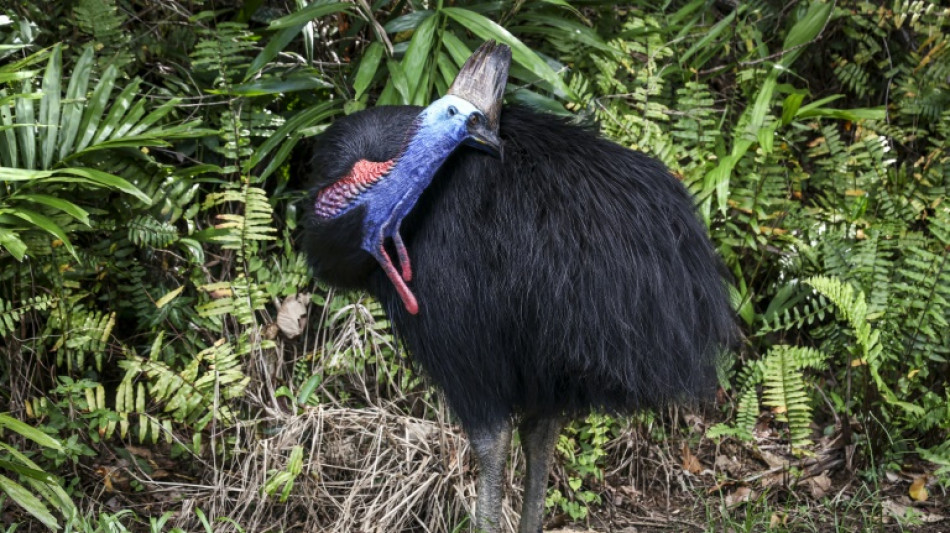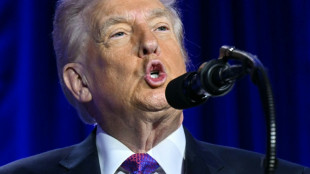
-
 New NBA dunk contest champ assured and shooting stars return
New NBA dunk contest champ assured and shooting stars return
-
Shiffrin says will use lessons learnt from Beijing flop at 2026 Games

-
 Takaichi tipped for big win as Japan votes
Takaichi tipped for big win as Japan votes
-
Lens return top of Ligue 1 with win over Rennes

-
 Shiffrin learning from Beijing lessons ahead of Milan-Cortina bow
Shiffrin learning from Beijing lessons ahead of Milan-Cortina bow
-
Demonstrators in Berlin call for fall of Iran's Islamic republic

-
 'Free the mountains!": clashes at Milan protest over Winter Olympics
'Free the mountains!": clashes at Milan protest over Winter Olympics
-
Townsend accepts pressure will mount on him after Italy defeat

-
 BMW iX3 new style and design
BMW iX3 new style and design
-
Suryakumar's 84 leads India to opening win over USA in T20 World Cup

-
 Lollobrigida skates to first Italian gold of Milan-Cortina Games
Lollobrigida skates to first Italian gold of Milan-Cortina Games
-
Barca beat Mallorca to extend Liga lead

-
 Gyokeres lifts Arsenal nine clear as Man Utd pile pressure on Frank
Gyokeres lifts Arsenal nine clear as Man Utd pile pressure on Frank
-
Late Guirassy winner for Dortmund trims Bayern's lead atop Bundesliga

-
 'Free the mountains!": protest in Milan over Winter Olympics
'Free the mountains!": protest in Milan over Winter Olympics
-
Gyokeres double helps Arsenal stretch Premier League lead

-
 New Skoda Epiq: modern with range
New Skoda Epiq: modern with range
-
Six Nations misery for Townsend as Italy beat sorry Scotland

-
 Spain, Portugal face fresh storms, torrential rain
Spain, Portugal face fresh storms, torrential rain
-
Opinions of Zuckerberg hang over social media addiction trial jury selection

-
 Over 2,200 IS detainees transferred to Iraq from Syria: Iraqi official
Over 2,200 IS detainees transferred to Iraq from Syria: Iraqi official
-
Norway's Ruud tops Olympic men's freeski slopestyle qualifying

-
 Czech qualifier Bejlek claims first title in Abu Dhabi
Czech qualifier Bejlek claims first title in Abu Dhabi
-
French duo reach Shanghai, completing year-and-a-half walk

-
 Australian snowboarder James eyes elusive Olympic gold
Australian snowboarder James eyes elusive Olympic gold
-
Sequins and snow: Eva Adamczykova makes Olympic return

-
 Vonn set for Olympic medal bid after successful downhill training
Vonn set for Olympic medal bid after successful downhill training
-
Shepherd takes hat-trick as West Indies beat Scotland in T20 World Cup

-
 Sausages will sell after thrill-seeker Von Allmen wins Olympic downhill
Sausages will sell after thrill-seeker Von Allmen wins Olympic downhill
-
Swiss racer Von Allmen wins first gold of Winter Olympics

-
 'Wake up': Mum sparks comeback after scare for freeski star Gu
'Wake up': Mum sparks comeback after scare for freeski star Gu
-
Von Allmen wins men's Olympic downhill gold, first of Games

-
 First medals up for grabs at Winter Olympics
First medals up for grabs at Winter Olympics
-
Afghanistan captain Khan harbours dream of playing in Kabul

-
 Lindsey Vonn completes second Winter Olympics downhill training run
Lindsey Vonn completes second Winter Olympics downhill training run
-
Freeski star Gu survives major scare in Olympic slopestyle

-
 Iran FM looks to more nuclear talks, but warns US
Iran FM looks to more nuclear talks, but warns US
-
Hetmyer's six-hitting steers West Indies to 182-5 against Scotland

-
 After boos for Vance, IOC says it hopes for 'fair play'
After boos for Vance, IOC says it hopes for 'fair play'
-
Thousands gather as Pakistan buries victims of mosque suicide attack

-
 Lindsey Vonn completes second downhill training session
Lindsey Vonn completes second downhill training session
-
US pressing Ukraine and Russia to end war by June, Zelensky says

-
 Faheem blitz sees Pakistan avoid Netherlands shock at T20 World Cup
Faheem blitz sees Pakistan avoid Netherlands shock at T20 World Cup
-
Trump refuses to apologize for racist clip of Obamas as monkeys

-
 Takaichi talks tough on immigration on eve of vote
Takaichi talks tough on immigration on eve of vote
-
England's Salt passed fit for T20 World Cup opener

-
 Spain, Portugal brace for fresh storm after flood deaths
Spain, Portugal brace for fresh storm after flood deaths
-
Pakistan bowl out Netherlands for 147 in T20 World Cup opener

-
 Pushed to margins, women vanish from Bangladesh's political arena
Pushed to margins, women vanish from Bangladesh's political arena
-
Crypto firm accidentally sends $40 bn in bitcoin to users


Australia's fearsome 'dinosaur bird' stares down extinction
With legs like a velociraptor and a striking neon blue neck, the southern cassowary cuts a fearsome figure in the rainforests of northeast Australia.
It is best to admire these human-sized birdies -- and their rapier-sharp 10 centimetre (four inch) talons -- from afar.
"It's a modern-day dinosaur," said Peter Rowles, the rugged president of a community group protecting the endangered birds.
Fiercely territorial, when threatened they hiss and make a deep rumbling boom.
"When you first look at them eye to eye, that can be intimidating, because they've got big eyes, and they look straight at you and they do look a bit fierce," said Rowles.
These flightless birds are only found in Australia, New Guinea and some Pacific islands.
The Australian government lists them as endangered and estimates about 4,500 remain in the wild.
They are considered a "keystone species", meaning they play a vital role in maintaining biodiversity and helping spread seeds in the rainforest.
If cassowaries go extinct, the rainforests will suffer.
"We thought if we could save cassowaries, we also could save enough habitat to keep a lot of other species alive," Rowles explained.
His group is doing what it can to save these formidable birds, which stand 1.5 metres (five feet) tall and can weigh up to 75 kilos (165 pounds).
This includes making signs urging drivers to slow down, redesigning roads to better protect native habitats and running a cassowary hospital for injured birds.
The main threats to the cassowary are car strikes, clearing of native habitats, dog attacks and climate change.
"Cassowaries are not aggressive when they're treated well," said Rowles, with few recorded deaths caused by the species.
A young Australian boy was killed in 1926 after he chased the bird, who severed his jugular vein, while a Florida man perished in 2019 when his pet cassowary attacked.
- 'Naturally cranky birds' -
In the past 300 years, about 100 of Australia's unique flora and fauna species have been wiped off the planet.
This rate of extinction will likely increase, according to the World Wide Fund for Nature (WWF).
"There is so much that has to be done and resources are not available to have a significant impact," said Darren Grover, WWF Australia's acting chief conservation officer.
"We're looking at around 2,000 species on the Australian government's threatened species list and more and more species are added to that list yearly," he added.
Threats include climate change, habitat loss and invasive species, Grover said.
The Australian government has a national recovery plan underway to save the iconic cassowary bird -- as it does with many other species -- that includes working with Indigenous and conservation groups.
Much of the country's conservation efforts focus on protecting keystone species, a concept developed by zoologists in the 1960s.
Grover said this is the best approach when resources are limited, as it provides flow-on effects to other animals in that habitat.
But this strategy can only go so far, he warned: "I don't think we can ever do enough to save our wildlife in Australia."
"Cassowaries are amazing species and whenever you get to see them in the wild is fantastic," he said.
"But be careful because they are naturally cranky birds, they are big and powerful and we need to give them some space."
S.Abdullah--SF-PST



